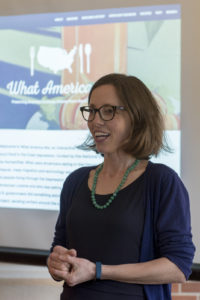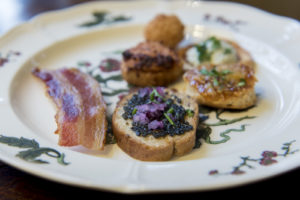On Thursday, March 23, the What America Ate project launch was celebrated at the Cowles House at Michigan State University.

Dr. Helen Zoe Veit, MSU Historian and Principal Investigator for the project, shows off the What America Ate website.
The What America Ate project, funded by the National Endowment for the Humanities, is a collaboration between Helen Zoe Veit of the Michigan State University Department of History, Peter Berg of the Michigan State University libraries, and Dean Rehberger of Matrix: the Center for Digital Humanities. Working with state archives and university libraries across the country for the last three years, the team has collected and digitized thousands of documents related to American food in the Great Depression. What America Ate is now a dynamic website giving the general public access to rare historical documents and new ways to interact with them.
During the reception Dr. Veit presented features of the whatamericaate.org website, which was designed in collaboration with MATRIX. The website’s
Depression-era sources include hundreds of community cookbooks, food advertisements, and original documents from the 1930s WPA “America Eats” project.
The PIs of the project, Dr. Veit, Dr. Berg, and Dr. Rehberger, personally thanked all those who made the project come together, especially Austin Truchan who was the lead graphic designer for the website.
Dr. Veit said, “It’s exciting to be launching a beautiful website designed to present humanities ideas to a public audience. So many people have contributed to the What America Ate project, and I think everyone is optimistic that it will contribute to a growing interest in food history among non-academics and academics alike.”

Some of the appetizers available for sampling included Croutes of Caviar, Peanut Butter & Bacon and Deviled Ham & Cheese.
The reception featured drinks and hors d’oeuvres from 1930s cookbooks featured on the website, including “Stuffed Celery,” “Peanut Butter and Bacon,” and “Ak-Sar-Ben Punch.” Project collaborators including MATRIX employees, MSU library staff members, and history department faculty.
Special thanks to the History Department at MSU and Walter Hawthorne, History Chair, for supporting the reception. And deep thanks to the National Endowment for the Humanities, Division of Preservation and Access for supporting the project.